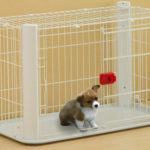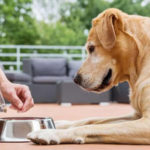Teacup dogs are adorable, highly intelligent, and easy to train, making them one of the most sought-after pets today. However, taking the best care of these furry friends requires some knowledge and understanding of their specific needs. Let’s explore the fascinating world of Teacup dogs and learn how to provide them with the love and care they deserve.
1. All About Teacup Dogs:
Origin of Teacup Dogs
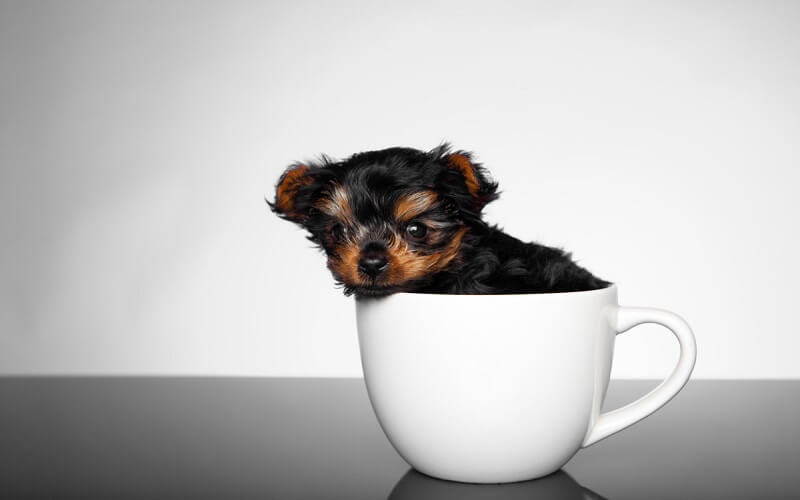 Teacup dogs refer to canines with a tiny stature, no larger than a teacup.
Teacup dogs refer to canines with a tiny stature, no larger than a teacup.
The term “Teacup” is used to describe dogs with an incredibly small size, typically no taller than a teacup. According to the American Kennel Club (AKC), a dog weighing between 1kg and 3kg and standing approximately 15cm tall at maturity is classified as a Teacup, regardless of its breed.
Their miniature size and adorable appearance have made Teacup dogs a favorite among dog enthusiasts.
Classification of Teacup Dogs
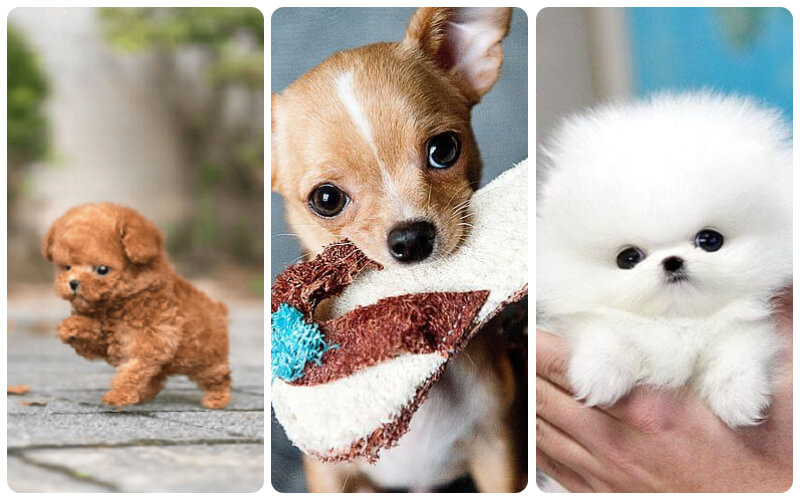 There are three popular Teacup dog breeds: Teacup Poodle, Teacup Chihuahua, and Teacup Pomeranian.
There are three popular Teacup dog breeds: Teacup Poodle, Teacup Chihuahua, and Teacup Pomeranian.
In the current market, three Teacup dog breeds stand out: Teacup Poodle, Teacup Chihuahua, and Teacup Pomeranian. Among dog enthusiasts, the Chihuahua line is particularly popular, followed by the Poodle and then the Pomeranian. Nonetheless, all three breeds are highly sought-after by dog lovers.
Common Coat Colors of Teacup Dogs
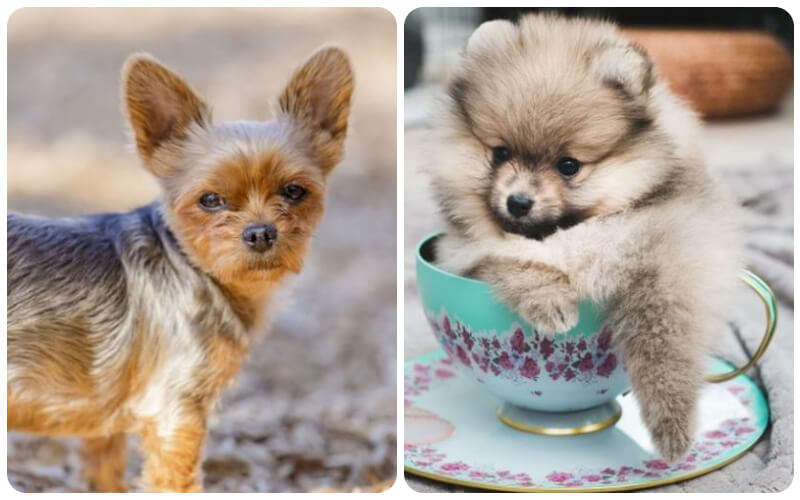 Teacup dogs come in a variety of breeds and coat colors to suit different preferences.
Teacup dogs come in a variety of breeds and coat colors to suit different preferences.
Teacup dogs offer a diverse range of breeds and coat colors, ensuring there’s something for every dog lover’s taste. Coat colors include black, white, chocolate, milk, and many others, all depending on the puppy’s parents.
Physical Characteristics of Teacup Dogs
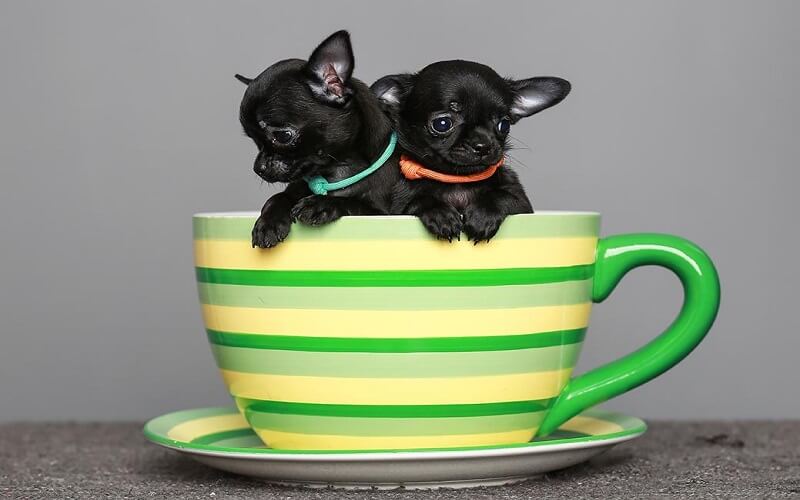 The most striking feature of Teacup dogs is their tiny size, comparable to that of a teacup.
The most striking feature of Teacup dogs is their tiny size, comparable to that of a teacup.
The defining characteristic of Teacup dogs is their diminutive size, typically no taller than a teacup. To be classified as a Teacup, a dog must stand under 20cm tall and weigh between 1-2kg.
Personality Traits
While Teacup dogs encompass various breeds, each with its unique personality traits, there are some commonalities among them:
- Teacup dogs exhibit a wide range of personalities across different breeds.
- Teacup Poodle: Known for their intelligence, agility, and affectionate nature. They can be quiet at times, but also enjoy playful moments, especially when around people.
- Teacup Pomeranian: Obedient yet mischievous, and prone to excessive barking. Early training is essential to teach them when to stop barking.
- Teacup Chihuahua: Intelligent, affectionate, and playful, with a strong sense of loyalty. They will alert their owners by barking when strangers approach.
2. Caring for Your Teacup Dog:
Feeding Your Teacup Dog
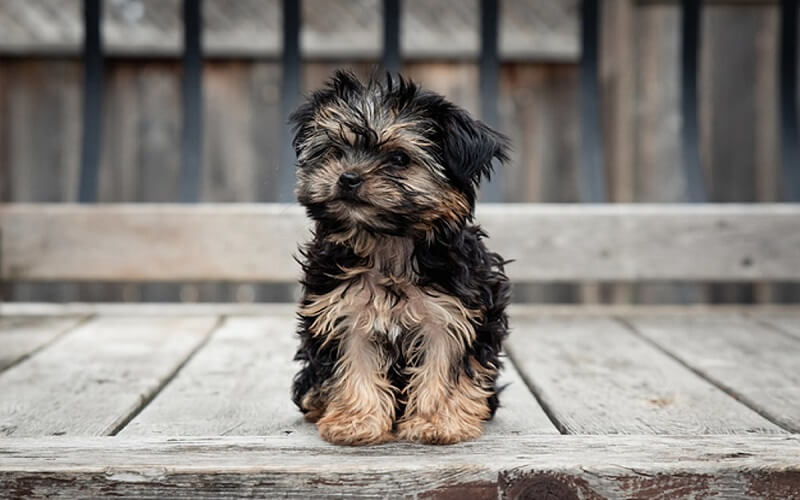 Due to their small size, Teacup dogs require a small amount of food. Ensure it’s soft, and always maintain high standards of food quality.
Due to their small size, Teacup dogs require a small amount of food. Ensure it’s soft, and always maintain high standards of food quality.
Given their tiny stature, Teacup dogs require minimal food. It’s important to feed them only soft food and to be vigilant about the quality of their meals, as consuming spoiled or unhygienic food can lead to gastrointestinal issues.
Grooming and Hygiene for Teacup Dogs
Teacup dogs have delicate digestive systems and are prone to gastrointestinal issues, so it’s crucial to maintain their living space clean and ensure they sleep in a hygienic and well-ventilated area. Failure to do so may result in viral or bacterial infections.
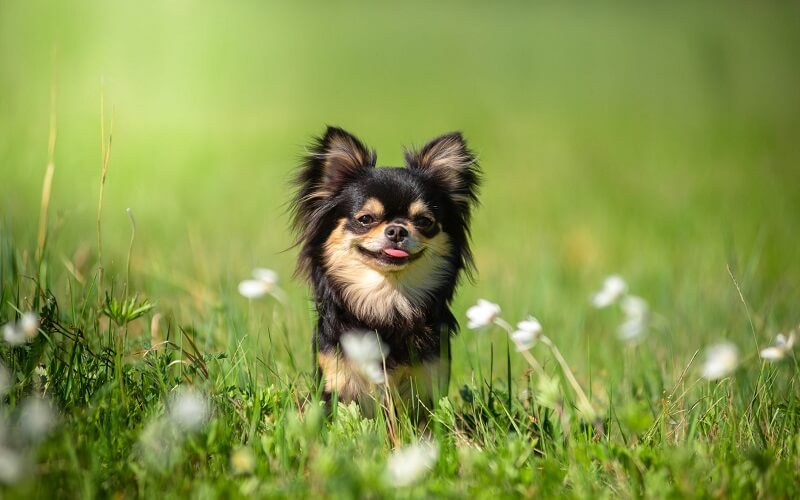 Teacup dogs don’t require frequent baths due to their low activity levels and minimal sweating.
Teacup dogs don’t require frequent baths due to their low activity levels and minimal sweating.
Teacup dogs don’t need frequent baths since they don’t exercise much and produce minimal sweat. In fact, excessive bathing can make them prone to catching a cold. Instead, use a damp cloth to wipe their fur, followed by a dry towel to keep them clean and comfortable.
Additionally, remember to clean their food bowls after each meal and maintain the hygiene of their eating area and food preparation space. If you want to be extra cautious, wash your hands before handling their food to prevent any bacteria from transferring from your hands to their food.
Common Health Issues in Teacup Dogs
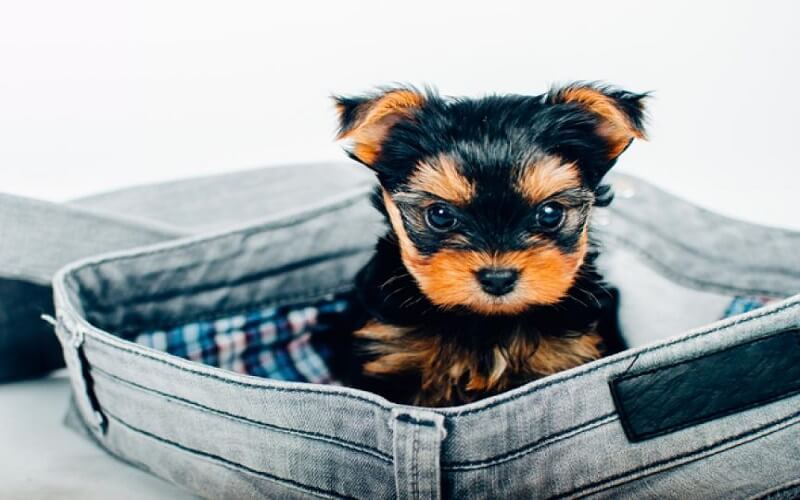 Generally, Teacup dogs are healthy and easy to care for.
Generally, Teacup dogs are healthy and easy to care for.
Teacup dogs are generally healthy and easy to care for. However, due to their small size and genetic predispositions, they may be more susceptible to health issues than standard-sized dogs. Common health concerns include hypoglycemia, patellar luxation, heart problems, heart defects, tracheal collapse, and gum disease.
Important Care Tips for Teacup Dogs
 Avoid frequent bathing for Teacup dogs, and ensure they are thoroughly dried after each bath to prevent them from catching a cold.
Avoid frequent bathing for Teacup dogs, and ensure they are thoroughly dried after each bath to prevent them from catching a cold.
- Maintain high standards for their food quality to prevent gastrointestinal issues.
- Avoid frequent bathing, and ensure they are thoroughly dried after each bath to prevent them from catching a cold.
- Don’t let Teacup dogs roam freely outdoors to prevent accidents and potential injuries. Keep them out of the reach of children to avoid rough handling.
- Provide them with dog clothing to stay warm, especially for breeds like Poodles. Groom them at least once a month to remove dirty and tangled fur.
- Trim their nails regularly (every two weeks), brush their teeth daily with a small, soft-bristled brush, and limit their unsupervised interactions with young children.
- Moderate their exercise to 10-15 minutes daily. Schedule regular check-ups with the vet every three months.
3. Buying a Teacup Dog:
Price Range of Teacup Dogs
The market offers a wide range of prices for Teacup dogs. If you opt for a locally bred Teacup without papers, you can expect to pay around 5-6 million VND. However, a Teacup with a pedigree will cost you between 7-9 million VND.
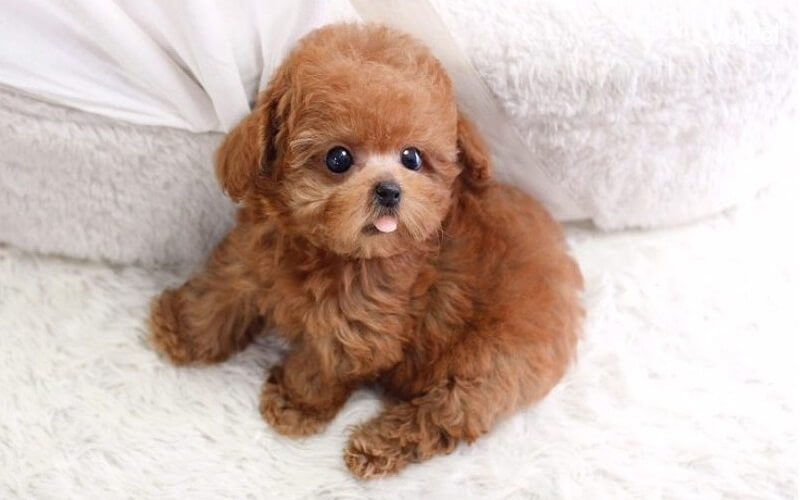 Teacup dogs are available at various price points depending on their origin.
Teacup dogs are available at various price points depending on their origin.
Thailand has established itself as a trusted source of rare dog breeds. When you factor in the shipping costs, a Teacup dog imported from Thailand can cost anywhere from 15-20 million VND.
On the other hand, the European market specializes in purebred dogs with impeccable lineage and proper documentation. As a result, prices for Teacup dogs from Europe typically start at $2000 and go upwards.
Important Considerations When Buying a Teacup Dog
It’s advisable to adopt Teacup dogs that are at least 2-3 months old, as younger puppies have a higher risk of mortality. Therefore, it’s essential to acquire your Teacup from a reputable seller or breeder who can provide information about the dog’s origin and health status.
 Opt for a Teacup dog that has received all its necessary vaccinations and has a strong immune system.
Opt for a Teacup dog that has received all its necessary vaccinations and has a strong immune system.
Choose a Teacup dog that has been adequately vaccinated and has a robust immune system. Additionally, consider your budget, as these dogs can be expensive due to the challenges in breeding and high demand. Finally, consult the seller about the Teacup’s dietary requirements, as they have sensitive digestive systems and require careful, meticulous care.
In conclusion, this article has provided valuable insights into the world of Teacup dogs, enabling you to make an informed decision about welcoming one into your home, considering your financial capabilities.
Avoiding and Resolving Hair Loss in Dogs: Understand the Causes and Find Solutions
Are you concerned about the excessive hair shedding from your beloved pooch? While some of these issues may have physiological causes, there are many other factors at play. Find out more about the various causes, treatments, and preventive measures available to manage the excessive shedding of your pup.
The Ultimate Guide to Basic Dog Care for New Paw-rents
Dogs are man’s best friend and it’s easy to see why. These loyal, loving creatures have a special place in our hearts and homes. If you’re thinking of welcoming a furry friend into your life, it’s important to get to grips with the basics of dog care. So, if you’re new to the world of dog ownership, this guide is for you!
Have You Been Unknowingly Breaking These Dog Care Taboos?
Dogs are man’s best friend, and it’s easy to see why. These loyal, loving, and intelligent animals have captured the hearts of families worldwide, becoming beloved pets and integral members of our homes. But, with great paw-wer comes great responsibility; there are some dos and don’ts that every dog owner should know to ensure a harmonious and healthy life with their furry friend.



























